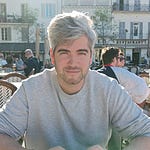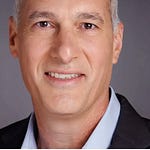A warm welcome to the 260 new subscribers who have joined since the last edition!
If you’re reading this and haven’t subscribed, sign up below to join a high-value community of 1,500 climatetech entrepreneurs, investors, and industry leaders.
Here’s how The Green Techpreneur can help you:
For entrepreneurs
I interview extraordinary climatetech entrepreneurs and investors and share practical advice on how to build your business and find funding. It’s insightful, actionable and fun to read or listen to.
Do you want help with standing out to attract enquiries, talent & investors?
For details visit...becomemorevisible and book a call if it resonates.
For climatetech investors
The Green Techpreneur publishes lists of pre-vetted startups seeking investment. Subscribe to be the first to know.
From converting their office into a makeshift school for Ukrainian refugee children to planting 25 million trees to seeing 20% YoY revenue growth – Ecosia has continued to thrive and contribute throughout a year that’s been rocked with macroeconomic crises.
As a not-for-profit search engine, Ecosia punches above its weight in terms of impact; it’s planted an incredible 153 million trees, transformed entire communities and brought degraded land back to life. It’s a tribute to how the cumulative power of small actions taken by the collective over time does create truly powerful global change.
And it all started because as a teenage boy, Ecosia Founder Christian Kroll was touched by the plight of the poor during a trip to India and determined he would use his future career to learn how to harness technology to drive positive impact.
At university, Christian had created a comparison website and was earning money from commissions: “I realised how much money I was spending on online advertisement and that Google is a really good business model."
His university side-hustle became the idea from which Ecosia was born, but Ecosia’s explosive growth would only come after Christian persevered through several failed projects – it was his third attempt at building a search engine.
Today, Ecosia is the world’s largest not-for-profit search engine and one of the best-known cleantech companies of our time. Supported by 15 million users worldwide, it plants millions of trees every year across 26 countries and powers its engine with 100% renewable energy.
The Green Techpreneur caught up with Ecosia’s extraordinary founder, Christian, to share insight on how they’ve navigated today’s fast-changing business climate.
How has the last year been for Ecosia?
In terms of trees being planted, we’re at 153 million at the moment, so that’s roughly 25 million more trees since last year. Of course, if you compare this to the number of trees we need to plant, it’s still much less than we need. We’re planting more trees than ever, but we would like to plant much, much faster! We hope more people use us so we can plant more trees.
Do you have statistics on your year on year growth?
We’ve had about a 20% revenue increase compared to one year ago - all our progress and statistics are publicly available in the financial reports we publish. Everyone can check the numbers on our website.
What’s the goal that you’re working towards?
We need to plant a trillion trees as quickly as possible. We’re still far away from achieving that – by we, I mean not just Ecosia, but we as a global society – we have to scale up.
We calculated that if everyone used us instead of Google, we could plant around 300 billion trees every year and we would get to that 1 trillion very quickly – it’s not impossible but we need more users to do it.
How have you navigated the challenges of this last year with all the crises globally?
Covid is still a problem and we’ve also been affected by that with people not being able to come to the office and also people spending less online which means less revenue for us to some extent, but I think it’s affected us much less than other industries.
The other big crisis was the invasion of Ukraine by Russia – that was a big shock for us. As a company, we committed to upscale our investment in renewable energy to do our part to transition away from fossil fuels and all those autocratic leaders that hold us hostage.
In Ecosia, we made investments into renewable energy to not only power our own service, but multiples of that – 500% of what we consume ourselves. We calculated what Google could do if they did the same, they could almost finance the entire transition away from fossil fuels in the European Union within just a few years.
So if other companies did the same, we wouldn’t even have this problem, we would be energy independent and this invasion would probably not have happened.
Now with fossil fuels getting expensive and it hurting our economy, it’s a consequence of us not taking the measures we should have taken 10 years ago. Now we have to deal with it and we’re trying to do our part with investment in renewable energy.
We transformed parts of our office, which were not in use because of the pandemic, into a temporary home for Ukrainian school children and we supported a project that helped refugees find accommodation.
But one of the issues is that the climate crisis has gotten much less attention over the last two years. It’s always the elephant in the room. Yes, we need to deal with COVID. Yes, we need to deal with this war. But don’t forget about the big monster that is waiting for us. Our house is on fire and we should talk about that every day and act accordingly.
What strategies did you use to rebrand Ecosia?
When you build things, after a while they get outdated. Design-wise we had some old looks and things didn’t really fit together and nobody had the time to look at it.
We put in a joint effort to update it and make the brand a bit more exciting. We wanted to make it clear that this is more than just a search engine, it’s a big movement, it’s potentially the biggest movement to solve the climate crisis online.
We wanted to be bold in not only the looks but in the communication on our website, and we highlighted a few things that we felt were underrepresented.
Often, we get the question, ‘yes, you’re planting some trees, but you keep the profits for yourself?’ People misunderstand that very often and we have to correct it and say ‘no, we give 100% of our profits to solving the climate crisis, and this will be true forever. It’s impossible to take any profits out of the company. It’s impossible to sell the company.’
The new, more bold visual style fits better with what we’re trying to do at Ecosia.
You’ve just launched freetree.io as a new browser extension, was this something you built based on feedback from users?
To some extent, it’s something that we incubated within Ecosia.
Freetree.io is a browser extension that you can install in your browser and it allows you to plant trees when shopping online without having to pay extra.
For example, say you’re purchasing cat food in an online shop, if this shop is a partner, then freetree.io will automatically pop up and a share of your purchase value will go into planting trees. The good thing about it is that users don’t have to pay extra – it’s the shops that give a share of the purchase value.
The concept behind it is that online shops often pay commissions to partners to drive traffic; if I bring traffic to that shop I get a commission, we used that concept for tree-planting.
It’s super easy to install and it’s a great addition to Ecosia. Instead of just planting trees through searches, you can plant trees when browsing other websites: we have thousands of partners, so freetree.io works when, for example, you’re booking a hotel, purchasing something online, or subscribing to a service. If someone is a partner, you’ll automatically get a popup that asks you if you want to plant trees.
We’ve received good feedback so far and would like more people to use freetree.io – the more people use it, the more trees we plant.
What are the social impacts of tree planting with Ecosia?
We pay people to plant trees in very low-income countries, so the income financially supports the people there and it regenerates the degraded land so it’s fertile again. Many of the trees that we are planting generate income later.
We not only plant trees, we plant hope
We start a positive cycle. People realise, ‘this degraded land that has gotten worse and worse over time, I can turn this around.’ This is super inspiring - especially for younger people. We have community collaboration so people understand that the trees we’re planting are important for soil fertility, for stabilising the local water cycles and for the well-being of the entire community. All of that combined has a massive impact.
I sometimes think of trees as our superweapon in the fight against many different crises.
Do you have Ecosia forests made up of all the trees planted?
It’s more of a mosaic than one big Ecosia forest; we have more than 20,000 different locations where we’ve planted and most of them are a maximum of a few hectares big.
If you look at the circumstances on the ground, there’s often no space to plant one big forest, so it makes sense to have lots of small pieces.
What message do you want to leave the readers with?
The final message is to take individual action, whether it is reducing your carbon footprint, offsetting your CO2 emissions, or participating in environmental projects.
We have to be a lot more active when it comes to solving the climate crisis and it’s urgent that we do all these things and go beyond the small changes to approach the big topics.
💥 Find out how you can stand out to attract enquiries, talent & investors…
For details visit...becomemorevisible and book a call.
Check out these lists of pre-vetted startups seeking investment
Rhizome2 Hydrogen, Traceless, Utility Bridge, Everdye, Kyomei
Beworks Automation, Cultivated Bio, Phase Biolabs, Salient Energy
Further reading:












